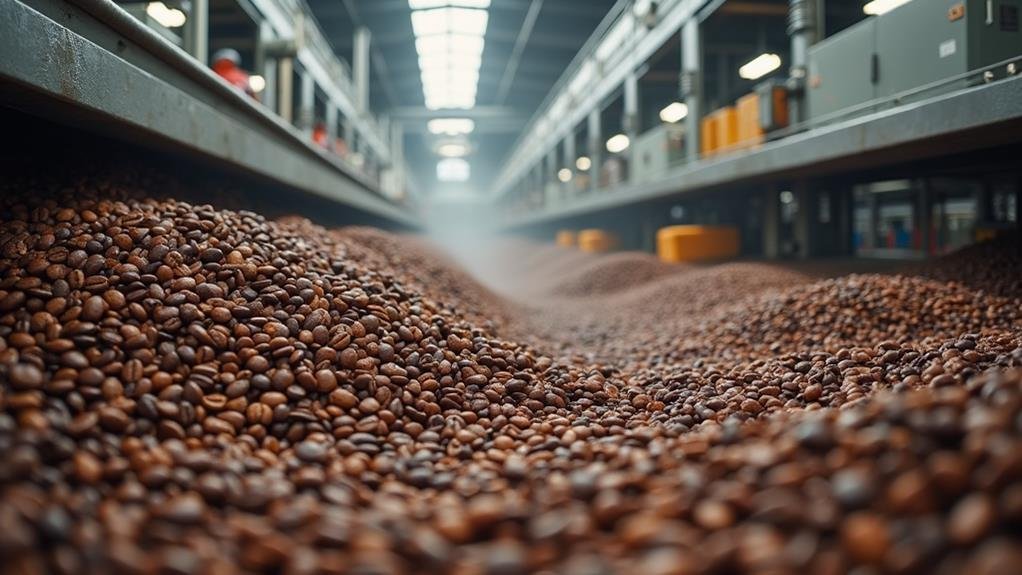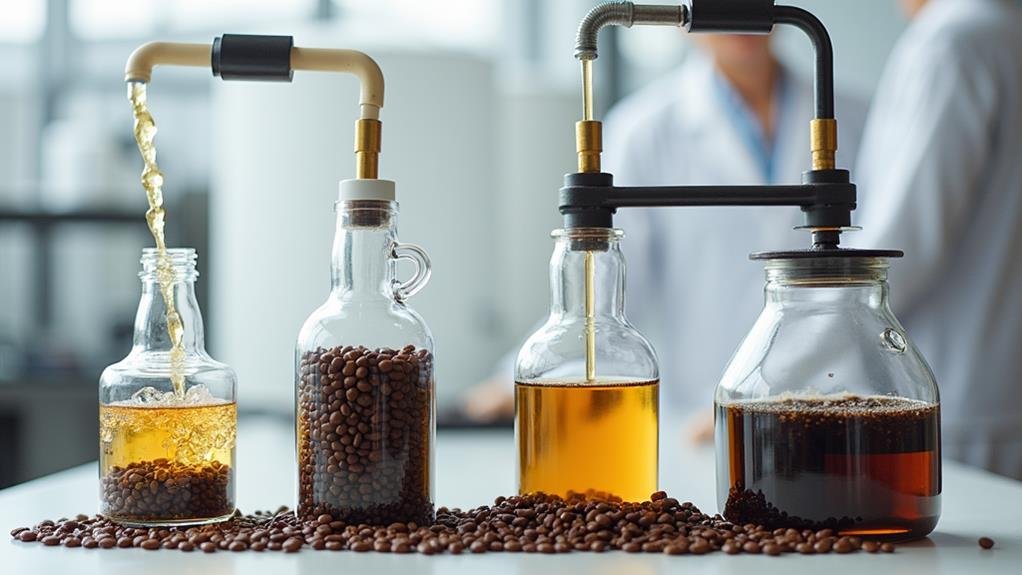If you're curious about decaf coffee, you're in good company. I've often wondered what makes decaf different from its regular counterpart. Fundamentally, decaf coffee is coffee that has had at least 97% of its caffeine removed through a strict process. But that's just the beginning. What's fascinating is how this process affects not just the caffeine content but also the taste and nutritional profile. As someone who appreciates a good cup of coffee without the jitters, I've found myself asking: Does decaf coffee offer the same health benefits as regular coffee? Let's explore this further to find out.
Decaf Coffee Production

Decaf coffee production is a meticulous process that involves removing at least 97% of the caffeine from coffee beans. This decaffeination process ensures that decaf coffee meets EU regulations for caffeine content. One popular method is the Swiss Water Process, which uses carbon dioxide or charcoal filters to extract caffeine from the beans. Other methods involve water or solvents to achieve the same goal.
The primary aim of these caffeine removal methods is to reduce the caffeine content significantly while preserving the flavor profile of regular coffee beans. For those with caffeine sensitivity, decaf coffee is an excellent option since it typically contains only around 2 mg of caffeine per cup, compared to the 70-140 mg found in regular coffee.
In addition to the Swiss Water Process, other decaffeination techniques are designed to minimize caffeine levels without compromising on taste. As a result, decaf coffee offers a full-bodied flavor similar to regular coffee but with much lower caffeine content. This makes it suitable for those who want to avoid caffeine altogether or reduce their intake without sacrificing the rich taste of coffee.
Caffeine Content and Safety
When it comes to caffeine content and safety, one of the key advantages of decaf coffee is its rigorous decaffeination process. This process guarantees that at least 97% of the caffeine is removed, resulting in a remarkably low amount of around 2 mg of caffeine per cup. For individuals sensitive to caffeine, this makes decaf coffee a suitable option without causing its side effects.
The safety of the decaffeination process is also a significant factor. Food safety regulators, such as the FDA, have deemed this process safe for consumption. Additionally, EU regulations are quite strict, allowing for less than 0.3% caffeine content in decaf coffee. These strict regulations reassure consumers that decaf coffee meets high safety standards.
Incorporating these facts into your understanding of decaf coffee highlights its appeal. If you enjoy the taste of coffee but are cautious about caffeine intake, decaf offers a compelling alternative. With such minimal caffeine content and adherence to stringent safety standards, you can enjoy your coffee without worrying about adverse effects. This makes decaf an excellent choice for anyone looking to minimize their caffeine intake while still appreciating the rich flavor of coffee.
Health Benefits of Decaf

Having established that decaf coffee is safe and suitable for those sensitive to caffeine, let's explore its health benefits. Decaf coffee, like its caffeinated counterpart, contains valuable antioxidants such as chlorogenic acid and polyphenols. These compounds offer several health benefits that make decaf coffee a nutritious choice.
| Health Benefit | Explanation |
|---|---|
| Reduced risk of type 2 diabetes | Studies indicate that consuming decaf coffee can lower the risk of developing type 2 diabetes. |
| Improved liver function | Decaf coffee may contribute to better liver health, supporting overall bodily function. |
| Lower risk of premature death | Research suggests that decaf coffee consumption could reduce the risk of premature death. |
| Positive effects on aging and neurodegenerative diseases | Antioxidants in decaf coffee may provide benefits in slowing down aging processes and reducing the risk of neurodegenerative diseases. |
| Nutritional value | Minor nutrients like magnesium and potassium are also present in decaf coffee, adding to its nutritional profile. |
Decaf coffee is not just an alternative for those sensitive to caffeine; it offers genuine health benefits without the side effects associated with regular coffee. Whether you're looking to manage your caffeine intake or simply enjoy a cup without worry, decaf coffee is a viable option that supports your overall health and well-being.
Taste and Nutritional Differences
If you're considering switching to decaf coffee, you might wonder how it compares in taste and nutritional content to its caffeinated counterpart. Decaf coffee has a slightly different taste and smell compared to regular coffee due to the removal of caffeine. However, quality decaf coffee, like NESCAFÉ, maintains the rich taste and aroma of regular coffee without compromising on flavor.
In terms of nutritional value, decaf coffee contains many of the same beneficial compounds as regular coffee. For instance, decaf coffee is rich in antioxidants such as chlorogenic acid and polyphenols, which are also found in caffeinated coffee. These antioxidants contribute significantly to the health benefits associated with coffee consumption.
Additionally, decaf coffee includes minor nutrients like magnesium and potassium, which add to its nutritional profile.
Decaffeination Methods Explained

Decaf coffee's journey from caffeinated beans to decaffeinated brew involves several precise methods, each crafted to remove at least 97% of the caffeine. Let's take a closer look at these decaffeination methods.
Here are the key methods used for decaf coffee:
- Direct Contact Method: This involves steaming, solvent bonding, washing, and roasting the beans to reduce caffeine content.
- SWISS WATER Process: This method uses activated charcoal to filter out caffeine while preserving flavor.
- Natural Decaffeination: This process uses liquid carbon dioxide under high pressure to dissolve caffeine from the beans.
- Common Step: All decaffeination methods start with soaking beans in warm water to soften them for easier caffeine removal before roasting.
Each method has its own unique approach to achieving the same goal: notably reducing the caffeine content of coffee beans. The Direct Contact Method and Natural Decaffeination rely on solvents or pressurized gas to extract caffeine, while the SWISS WATER Process leverages activated charcoal for a solvent-free option.
Regardless of the method, careful attention is given to significantly reduce the impact on the flavor profile of the coffee. By understanding these processes, you can appreciate the precision and care that goes into creating your favorite decaf coffee.
Is Decaf Coffee Healthy?
After grasping the intricate processes involved in decaffeinating coffee beans, it's natural to wonder about the health implications of consuming decaf coffee. Decaf coffee, like its regular counterpart, contains several beneficial compounds that contribute to its health benefits. Antioxidants such as chlorogenic acid and polyphenols are present in decaf coffee, offering similar protective effects against oxidative stress and inflammation.
Scientific evidence suggests that consuming decaf coffee may be linked to increased longevity and a decreased cancer risk. This is credited to the antioxidant properties that help neutralize harmful free radicals in the body. Unlike regular coffee, a typical cup of decaf coffee has about 2 milligrams of caffeine, making it a valuable option for those who wish to limit their caffeine intake.
Health authorities support the positive effects of decaf coffee on aging, neurodegenerative diseases, and heartburn symptoms. The caffeine content is notably reduced, yet the health benefits remain substantial. Hence, decaf coffee can be a part of a healthy diet for individuals looking to enjoy the taste of coffee without the high caffeine content.
Conclusion
Decaf coffee is like a symphony without the dominant note of caffeine, yet still rich and harmonious. Through precise decaffeination methods, it retains its full-bodied flavor while catering to those who seek a caffeine-free experience. Whether you're looking for health benefits or simply a taste similar to regular coffee, decaf offers a balanced and safe alternative. It's a choice that lets you enjoy the essence of coffee without the stimulating effects, much like appreciating music for its melody alone.

